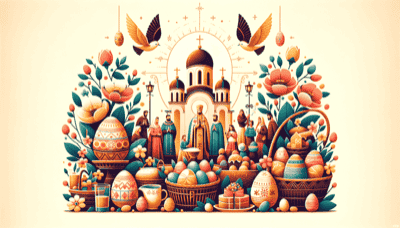We're here to help you keep count of the days to or since a date. Just click the button below and enter your chosen date to get started. Also choose the suggested days or search for a special day above #countingthedays

History and Traditions: Easter in Serbia is a significant religious holiday, rooted deeply in the traditions of the Serbian Orthodox Church. The date of Easter follows the Julian calendar, which often differs from the Gregorian calendar used by many western countries, resulting in a celebration that may occur weeks apart from Western Easter.
One of the most prominent traditions is the painting and decorating of eggs, known as "Uskršnja jaja." The first egg is traditionally painted red to symbolize the blood of Christ and is called "Čuvarkuća," meaning "the keeper of the house." This egg is kept until next year's Easter to ensure good health to family members.
Holy Week leading up to Easter Sunday includes several services and rituals. Good Friday is observed with reverence as a day of mourning for Christ's crucifixion. Churches hold processions and special services.
Easter Day Celebrations: On Easter Sunday, Serbians attend morning church services where they receive blessings. People greet each other with "Hristos Voskrese" (Christ has risen) and respond with "Vaistinu Voskrese" (Indeed He has risen).
Following church services, families gather for a festive meal which often includes dishes such as roasted lamb or pork, along with other traditional foods like cheese pie, breads, and salads. The meal typically begins with breaking the fast that was maintained during Lent.
A popular game played on this day involves hitting each other's eggs with one's own egg; the person whose egg remains uncracked is believed to have good luck for the upcoming year.
Family gatherings are common, emphasizing unity and celebration. Visiting relatives' homes during this time is customary, where hosts offer eggs along with other treats to their guests.
Easter Monday also holds significance and is considered a continuation of the celebration, often involving more relaxed family activities and enjoyment after the solemn observance of Lent.